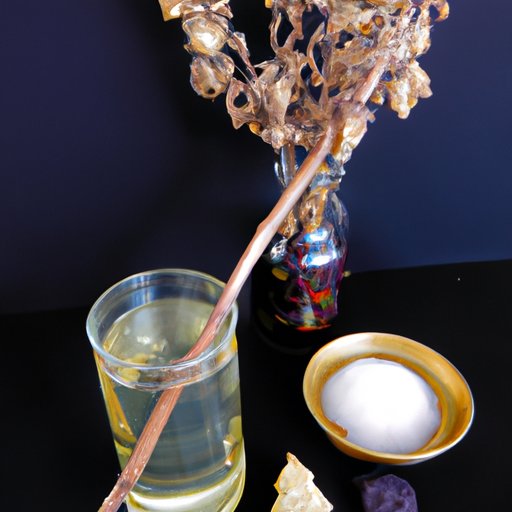
Introduction
Holy water is a sacred substance used in various traditions to bless people, objects, and spaces. Making holy water can be a simple or elaborate process, depending on the tradition and purpose. In this article, we will explore different methods of making holy water from different traditions. Whether you are a religious practitioner or a spiritual seeker, you can learn a method that resonates with you.
The Simplest Method: How to Make Holy Water with Only Water and Salt
The simplest method of making holy water involves only water and salt. It is a common practice in Christianity, especially Catholicism, where a priest blesses water and adds salt to it during the rite of exorcism.
To make holy water with only water and salt, follow these steps:
- Fill a clean container with water.
- Add a handful of salt to the water.
- Stir the water with a spoon or your hand in a clockwise motion.
- Pray or intention for the water to be blessed and purified.
- Use the holy water immediately or store it in a bottle or container for future use.
The significance of salt and water in this method is rooted in their symbolism. Salt represents purity and preservation, as it has been used to preserve food and purify wounds for centuries. In Christianity, Jesus called his followers the “salt of the earth,” referring to their role in preserving the goodness of the world. Water, on the other hand, represents life and renewal, as it is essential for human survival and the growth of plants.
The Ancient Tradition: A Guide to Making Holy Water with Herbs and Oils
Another method of making holy water involves using herbs and oils to infuse water with spiritual properties. This method is common in indigenous, pagan, and new age traditions.
To make holy water with herbs and oils, follow these steps:
- Fill a clean container with water.
- Add a handful of herbs or a few drops of essential oil to the water.
- Stir the water with a spoon or your hand in a clockwise motion.
- Pray or intention for the water to be blessed and infused with the properties of the herbs or oils.
- Let the water sit for a few hours or overnight to allow the herbs or oils to infuse.
- Strain the water to remove the herbs or residual oil.
- Use the holy water immediately or store it in a bottle or container for future use.
The history and significance of this method vary depending on the tradition. In indigenous cultures, herbs and oils are used to connect with the spirits of nature and ancestors. In pagan traditions, specific herbs and oils are associated with certain deities or intentions, such as love or protection. In new age spirituality, herbs and oils are used to enhance the energy of spaces and objects.
The Catholic Rite: Step-by-Step Instructions on Making Holy Water According to Church Doctrine
The Catholic Church has a specific rite for making holy water, which involves the use of exorcised salt and prayers. This method is believed to infuse water with the power of the Holy Spirit and protect against evil forces.
To make holy water according to the Catholic Church’s doctrine, follow these steps:
- Obtain exorcised salt from a priest or religious supply store.
- Fill a clean container with water.
- Add a pinch of exorcised salt to the water.
- Pray the prayers specified by the Catholic Church while holding your hand over the salt and water.
- Use the holy water immediately or store it in a bottle or container for future use.
The significance of each step in the process is tied to Catholic theology and tradition. Exorcised salt is believed to be free from demonic influence and imbued with spiritual power by a priest. Prayers invoke the Holy Spirit and ask for protection from evil. The resulting holy water is considered a powerful sacramental that can be used for blessings, sacraments, and spiritual rites.

The New Age Approach: How to Create Holy Water Using Crystals and Intention Setting
In new age spirituality, crystals are often used for healing and manifestation purposes. They can also be used to infuse water with specific frequencies and intentions through a process called crystal charging. This method can be used to make holy water that aligns with your spiritual goals and needs.
To make holy water using crystals and intention setting, follow these steps:
- Fill a clean container with water.
- Choose a crystal that resonates with your intention or goal.
- Place the crystal near or in the water and leave it for a few hours or overnight.
- Pray or intention for the crystal to infuse the water with its frequency and your intention.
- Use the holy water immediately or store it in a bottle or container for future use.
The significance of crystals and intention in this method is based on the principle of resonance. Crystals are believed to vibrate at certain frequencies that affect the energy field of living beings and spaces. By choosing a crystal that resonates with your intention, you can amplify its power and use it to create a customized holy water that suits your needs.
The Wiccan Method: Crafting Holy Water with Moon Phases and Natural Elements
In Wiccan tradition, the moon and the elements of nature are associated with different energies and powers. Holy water can be made by using these correspondences, along with specific rituals and spells, to empower water with the energy of the moon and the elements.
To make holy water using moon phases and natural elements, follow these steps:
- Choose a moon phase that aligns with your intention or goal. For example, a full moon is associated with abundance and manifestation.
- Fill a clean container with water.
- Add natural elements that correspond to your intention or goal. For example, rose petals for love or cinnamon for prosperity.
- Expose the water to the moonlight for at least three hours or overnight, depending on the moon phase.
- Pray or cast a spell to empower the water with the elements’ energy and the moon’s power.
- Strain the water to remove the natural elements.
- Use the holy water immediately or store it in a bottle or container for future use.
The significance of moon phases and natural elements in Wiccan tradition is tied to the cycles of nature and the energy of the elements. The moon is believed to influence the tides, emotions, and psychic abilities, among other things. Natural elements, such as herbs, flowers, and spices, are believed to have specific properties that can be used for spells and rituals.
The Personal Touch: Making Holy Water in Your Own Home with Meaningful Objects
Making holy water can also be a personal and meaningful process that involves using objects that resonate with your spiritual path and experiences. This method is a creative and empowering way to make holy water that reflects your personality and beliefs.
To make holy water using meaningful objects, follow these steps:
- Choose a container that has personal meaning to you. It could be a family heirloom, a handmade vase, or a quirky souvenir from a trip.
- Fill the container with water.
- Add objects that have personal meaning to you and that you associate with spirituality or protection. For example, a stone from a sacred site, a piece of jewelry, or a prayer book.
- Pray or intention for the water to be blessed and infused with the energy of the objects and your personal spirituality.
- Use the holy water immediately or store it in a bottle or container for future use.
The significance of using objects with personal meaning is rooted in the principle of intention. By infusing the water with the energy of objects that have symbolic value to you, you can create a holy water that reflects your personal spiritual journey. This method is also a great way to incorporate ritual and mindfulness into your daily life.
The Scientific Explanation: Understanding the Properties of Water that Make It Holy
While holy water has spiritual significance and symbolic value in different traditions, some scientists and researchers have explored the properties of water that make it unique and potentially holy. From the molecular structure to the memory of water, water has many properties that can be studied and understood from a scientific perspective.
Some studies suggest that water can be “structured” by external factors, such as music, intention, or even prayer. Other studies have looked at the effect of water on human health and emotional well-being, showing that water can have a significant impact on our bodies and minds.
The significance of science in understanding holy water is that it can provide a bridge between spiritual and material reality. By exploring the properties of water that make it unique and potentially holy, we can deepen our understanding of the spiritual significance of water and how it can be used for healing and transformation.
Conclusion
As we have seen, making holy water can be a simple or elaborate process, depending on the tradition and purpose. From using only water and salt to infusing water with the energy of crystals and moon phases, there are many methods to choose from. We encourage readers to try different methods and find the one that resonates best with them. Whether you are a religious practitioner or a spiritual seeker, you can create a holy water that aligns with your needs and beliefs.





